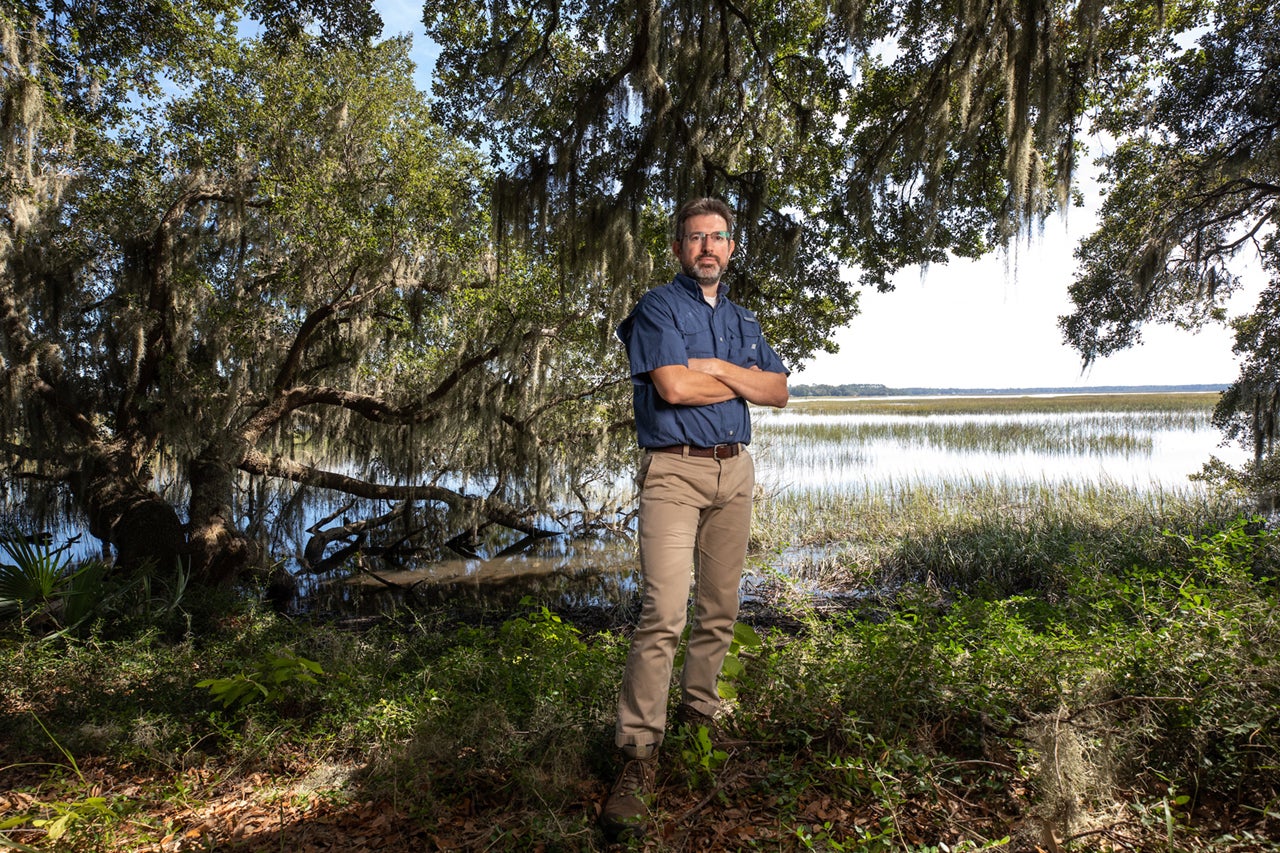On a recent afternoon, biology professor Matt Rutter watched as huge flock of roseate spoonbills and wood storks swirled in the sky above the College of Charleston at Stono Preserve.
“It is truly just a beautiful place,” says Rutter of the property located along the Stono River about 20 miles south of the College’s main campus in downtown Charleston. “I am still exploring it. It’s a wonderful place to be.”
With a rich history and a variety of ecosystems – including longleaf pine forests, wetlands, savannas, tidal marshes as well as brackish, saltwater and freshwater ponds – the 881 acres of Stono Preserve offer no shortage of learning opportunities for students and faculty.
That’s why, with the support of Interim Provost Frances C. Welch and Sebastian van Delden, interim dean of the School of Sciences and Mathematics, Rutter has been appointed as the College’s first academic director of Stono Preserve.
“We are delighted to have a world-class scholar like Matt Rutter as our first-ever academic director for Stono Preserve,” says van Delden. “The School of Sciences and Mathematics strives toward excellence in experiential learning, and I’m excited to see what all new opportunities for our students will be developed under Dr. Rutter’s leadership.”
Welch agrees, noting that she is confident in Rutter’s ability to grow the academic programming at Stono Preserve.
“He is an excellent leader who has assembled an impressive steering committee, and I look forward to all that will be accomplished under Dr. Rutter’s leadership,” she says.
Rutter, who officially took on the role in the summer of 2019, says the goal is to increase awareness of the property among faculty and to help them find creative ways of engaging students through projects, labs and field trips there.
RELATED: Read about the Hidden Hands garden at Stono Preserve.
“It’s a spectacular place. It’s got nature. It’s got history. The story of artist John Henry Dick [who bequeathed the property to the College] is very interesting,” says Rutter. “There are so many things that come together at that location, and I’m just going to be encouraging people at the College to come get acquainted with Stono Preserve.”
Biology professor Melissa Hughes has been among a small group of faculty who have already been taking advantage of Stono’s unique learning environment. For the past few years, Hughes has taught an ornithology class, both the lecture and lab, at Stono. With a rich array of birds regularly nesting and feeding on the property, the location offers students plenty of up-close experiences with species of all shapes and sizes – and the two field stations on the property make it easy to conduct experiments or hold class discussions, as well.

Biology professor Melissa Hughes with students in her ornithology class at Stono Preserve. (Photo by Heather Moran)
“Teaching ornithology at Stono provides the class with a full immersion in ornithology,” says Hughes. “Stono isn’t a place we visit, as we visit other places on field trips, for example. Stono is our classroom. The students observe how the bird community changes with the seasons and how bird behavior changes with the seasons, because we’re there, watching them, every time the class meets. When we talk about the physics of flight, we can just look up and observe the differences in the soaring behaviors and wing shapes of black vultures and turkey vultures. They learn the habits of the resident birds: where the American kestrel likes to sit, where the red-headed woodpecker nests.”
Hughes adds, “When the semester is over, students sometimes linger after the final exam, reluctant to leave for the last time. How many other classrooms or labs foster that kind of connection?”
In addition to Hughes and her ornithology classes, geology, studio art and education professors among others have already held labs, classes and field trips at Stono Preserve. And the Student Garden at Stono Preserve offers hands-on experience with a variety of modern and historic gardening techniques.
A newly formed academic advisory committee for Stono Preserve comprised of faculty from different schools aims to evaluate the activities already happening on the property, to solve problems that might inhibit professors from holding classes and labs there and to begin creating a long-term vision for the types of academic activities that Stono could host.
“I want to expand the participation out at Stono to as many of the different schools, departments and programs as possible,” says Rutter. “I would love to see artistic performances out there. I would love to see something from the perspective of the business school, like what could we learn about the economy of the farm that was on the property. There’s still a ton of room to explore.”
Featured image: Matt Rutter at Stono Preserve. (Photo by Heather Moran)





